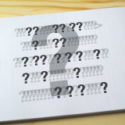There’s been a lot of talk about how the quality of writing is going downhill these days. But what does that mean, exactly? Sure, we can assume that if kids are lolling and btwing in term papers, the writing is probably not of high quality. But is there more to it? Moreover, is the quality of writing really going downhill? And if so, should this worry us?
Quality is a major theme of the book Zen and the Art of Motorcycle Maintenance, and the author begins his investigation by specifically analyzing quality in writing. Robert Pirsig’s idea of Quality is one that exists prior to any manifestation. In other words, it’s not the writing itself that is high or low quality; it’s what’s behind the writing. Therefore, if today’s writing does not have quality, perhaps this is because it is not as meditated as writing once was; the stuff behind the words isn’t as honed.
In Doing Our Own Thing, John McWhorter says that formal English has lost its value over the past several decades as we’ve shifted toward writing that is more reflective of oral English. He argues that this change has resulted in a decline in quality of oratory, poetry, theater, preaching and—ultimately—thinking.
Even so, McWhorter recognizes that the shift in writing from complex to straightforward has had some positive effects: Immigrants and minorities have begun to pass into the mainstream, and education has become more democratized.
Amalia Gnanadesikan shares this viewpoint. As she writes in The Writing Revolution, “[Language purists] may have a point about stylistic quality, but they have failed to notice that what they are really witnessing is the ultimate triumph of the written word –the point at which the technology becomes second nature to a whole society” (p 272). That is, writing isn’t going downhill entirely; it’s just that people have platforms for writing today who never would have in the past. Therefore a much higher proportion of writing is of lower quality, but that doesn’t necessarily mean that quality writing is nonexistent.
Noami Baron talks about this also in Always On. Similarly to Gnanadesikan, she argues that today’s writing has degraded simply because we’re doing so much more of it. Because of the sheer number of words each of us must type each day, writing has lost its expectation of quality. She observes that our face-to-face conversations, which are as a rule of lower quality than writing, are gradually being replaced by writing. As a result, writing falls in quality.
According to Baron, one of the primary manifestations of this fall in quality is spelling trouble. She condemns spell-check, saying it robs us of opportunities to learn to spell on our own (definitely true), and it causes us to rely on a tool that can’t solve all our problems. (Cant and wont are both words, after all, and even the virtual wizard doesn’t know you meant can’t or won’t.) I agree with Baron up to this point, but I don’t support her claim that spelling is about to spiral out of control.
In Always On, Baron cites the case of compound words. Is it makeup, make-up or make up? In this example, each of the three mean different things. But in less common words, that’s not a problem. Where are the innocent deaths that occur from someone spelling nonetheless as none-the-less? But even if the punctuation distinguishes among multiple meanings, the context almost always makes it clear. When you’re talking about how you need to use makeup before you can make up in time for the make-up, for example. But is it really so scandalous that a few words might have idiosyncratic spellings?
I don’t think so. After all, we already do this, both in spelling and in speech. In spelling, we have the famous U.S. and British differences. In speech, we have multiple pronunciations for words like aunt, either, adult and coupon—even such common words as a and the. We also have multiple possibilities for pluralizing certain words, like persona, which can pluralize as personas and personae. In my opinion, it’s highly unlikely that we’re going to slip into a chaotic world where everyday words have countless spellings, as they did in the olden days—the world Baron fears.
The paradigm of diversity versus understandability comes into play. Idiosyncratic spellings can only go so far before the issues in understandability outweigh the value of creative expression. Naturally, they will subside as we reconvene with a more rigid spelling system. (Granted, less rigid than what we had a century ago, perhaps, but rigid nonetheless.)
But is quality writing really all about good spelling? Certainly not. In fact, I’d like to think that mechanical issues are the smallest definers of quality. But then what are the important parts? Pirsig says in Zen that everyone knows, but no one can define them. Well, that’s not very helpful. If I can think back to high school with any accuracy, I remember a rubric we used to judge writing, using criteria like Content, Word Choice, Sentence Fluency, Organization and Voice. Of these, perhaps Content is the most important—it’s the one that requires you to have something to say in the first place.
Can we really claim that we’re spiraling downward in all these areas? McWhorter seems to think so, suggesting that we Americans have lost all capacity for formal argument and critical thinking. I don’t think that’s true; it’s just that formal argument and critical thinking are not found in all the places they once were.
 Follow
Follow

